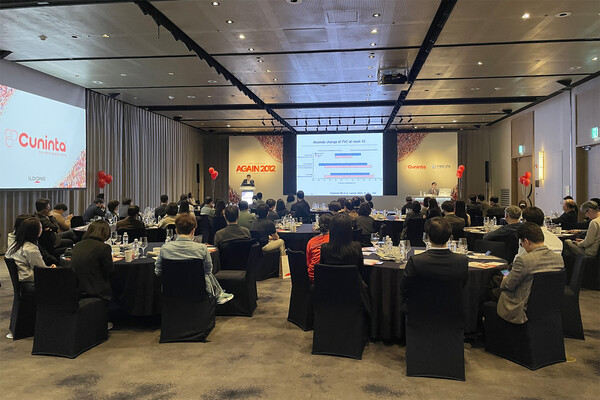Ildong Pharmaceutical is challenging Boehringer Ingelheim’s blockbuster idiopathic pulmonary fibrosis (IPF) drug, Ofev (nintedanib esylate), which is set to be covered by the Korean national health insurance system.

Ildong’s Ofev generic tablet, Cuninta, received approval from the Ministry of Food and Drug Safety on April 18. The company hosted a launch symposium for respiratory physicians nationwide at a hotel in Seongnam, Gyeonggi Province, last Saturday and Sunday.
Leveraging its long-standing academic network and marketing capabilities in the field of pulmonary diseases, Ildong Pharmaceutical aims to strengthen its presence in the market by expanding its respiratory product lineup, including the newly launched Cuninta. The company also supplies Pirespa, a pirfenidone-based drug for IPF treatment.
With Cuninta’s launch in the domestic market, competition with the original drug Ofev is expected to intensify. Notably, Ofev will be reimbursed starting May 1, nine years after its domestic approval, with an upper price limit of 20,960 won for 100 mg and 26,220 won for 150 mg.
Observers have pointed out that the government’s lukewarm attitude delayed Ofev’s reimbursement, limiting Korean patients’ access to treatment due to the high cost of over 3 million won per month. However, the upcoming reimbursement is expected to improve accessibility.
Ofev currently holds three indications in Korea: treatment of IPF, delayed decline in lung function in patients with systemic lupus erythematosus-associated interstitial lung disease (ILD), and treatment of chronic fibrotic interstitial lung disease with a progressive phenotype (progressive pulmonary fibrosis, PPF). Among these, pre-neurodegeneration-related ILD and progressive pulmonary fibrosis have been approved for reimbursement.
Cuninta was approved for the treatment of delayed decline in pulmonary function in patients with pre-neuronalization-associated ILD and chronic fibrotic ILD with a progressive phenotype, but not for IPF, one of Ofev’s key indications.
Local competition in the generic drug market is expected to escalate as Ofev’s patent expired in January.
In addition to Ildong’s Cuninta, Yungjin Pharm’s Nintebro and Daewoong Pharmaceutical’s Ofevia have been approved by the MFDS, while Chong Kun Dang Pharm, Hyundai Pharm, and Samoh Pharmaceutical are preparing to launch their own Ofev generics.
Korean drugmakers are highlighting that their products are developed as tablets — unlike Ofev, which is available as a soft capsule — and that they have enhanced patient convenience by reducing the pill size compared to the original.
Professor Emeritus Kim Dong-soon of the University of Ulsan College of Medicine (formerly a professor of respiratory medicine at Asan Medical Center), who attended the Cuninta launch event, said, “In the past, the lack of research data, treatments, and clinical experience regarding ILD was often unfortunate, but since the 2010s, the path to patient treatment has been widening through the efforts of physicians and pharmaceutical companies.”
He emphasized the need for continued attention to the field of ILD.
Related articles
- Can Bridge Bio's pulmonary fibrosis drug be transformed into cancer treatment?
- Ildong Pharm Group's pulmonary fibrosis drug candidate wins US orphan drug designation
- Insurance review panel gives green light to Tevimbra, Ofev, and Pemazyre
- Ofev’s reimbursement has been in limbo for 8 years. Will it be different this time?
- After 9-year wait, Boehringer’s IPF drug Ofev faces generic threat weeks into Korea launch
- Ildong’s oral GLP-1 drug shows up to 13.8% weight loss in phase 1 trial

